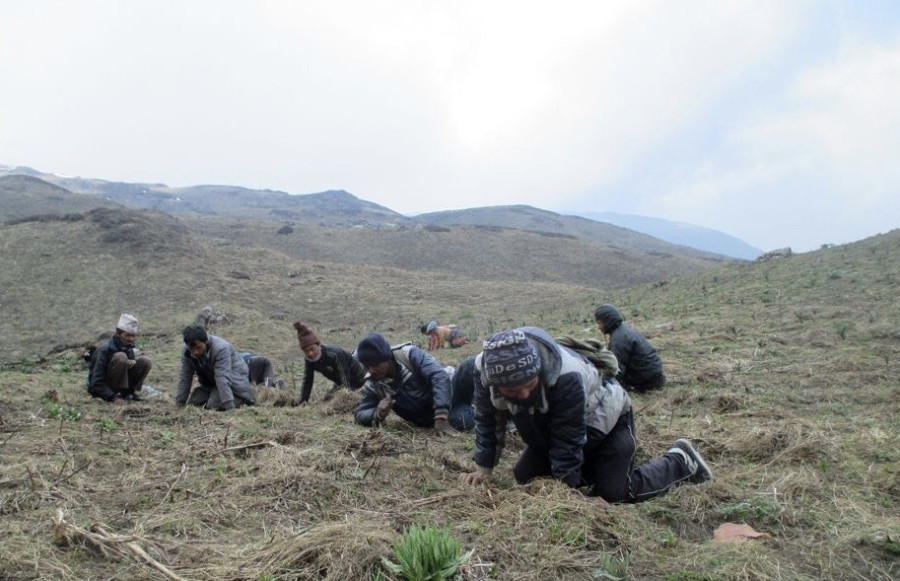Sudurpaschim Province
District authorities in Bajhang put a ban on yarshagumba collection this season amid coronavirus pandemic
On Friday, a meeting of Covid-19 Crisis Management decided to prohibit yarshagumba collection until further notice.
Basant Pratap Singh
The district authorities in Bajhang have imposed a ban on the collection of yarshagumba (Cordyceps synensis) this season because of the novel coronavirus pandemic.
On Friday, a meeting of the Covid-19 Crisis Management held in the chairmanship of Umesh Pandey, chief district officer of Bajhang, decided to prohibit yarshagumba collection until further notice.
“We have been informed that yarsha collectors have been visiting their respective local units to take permission for yarshagumba collection. During the ongoing pandemic, such activities will put human health at high risk. So, we have decided to ban yarsha collection this season,” said Pandey.
Yarshagumba, the caterpillar fungus, is harvested before the monsoon season, between May and June, when tens of thousands of people swarm over the Himalayan foothills in Rukum, Dolpa and Bajhang districts in western Nepal to collect the herb. Yarshagumba is found at elevations between 3,000 and 5,000 metres.
Yarsha collectors in Bajhang, who had started making preparations to climb the highlands, are dismayed at the government’s decision. Yarsha picking season in the district starts in mid-April.
“Yarsha collection is the main source of our income. We depend on the income to see us through the year. We will be left without money for the entire year if we are barred from collecting yarshagumba this season,” said Pabitra Bohara, a resident of Surma who was planning to climb the highlands. “We planned to stay in the highlands for two months like we do every year.”
Like Bohara, numerous people move towards the highlands in droves carrying blankets, tents and cooking materials with them as the picking season begins.
Ram Bohara of Dhalaun said his family makes at least Rs 500,000 to Rs 600,000 in two months by collecting yarshagumba in the highlands.
“If we cannot collect yarsha this season, we will have a hard time for the rest of the year,” Bohara said.
However, Rajendra Bahadur Dhami, chairman of Saipal Rural Municipality, said his office plans to allow people to collect yarshagumba from May 28 if the disease remains under control.
“However, if the situation gets worse, we will not send anyone up to the highlands,” said Dhami.
In Bajhang, every year, transactions worth Rs 400 million take place through the business of yarshagumba.
“The main source of income for the people of Surma and Saipal rural municipalities is yarshagumba. The people could face a shortage of food and essentials in the coming season if they are unable to collect yarshagumba,” said Dan Bahadur Surmeli, chairman of Bajhang Chamber of Commerce and Industry.
Yarshagumba is the world’s most expensive medicinal fungus. It can fetch as much as $100 per gram in the Chinese market, making it more expensive than gold, according to reports. Dubbed the Himalaya viagra, the herb is also used to cure anaemia, chest and lung infections, tuberculosis, Hepatitis B and kidney and liver diseases.




 21.12°C Kathmandu
21.12°C Kathmandu















